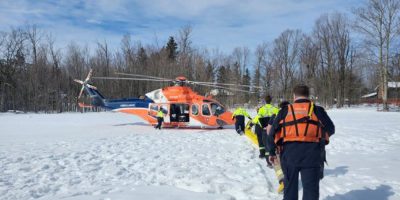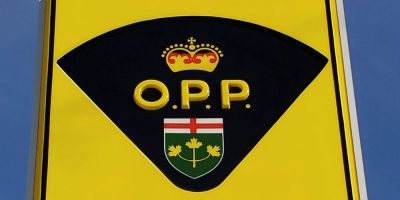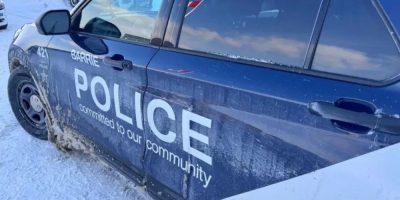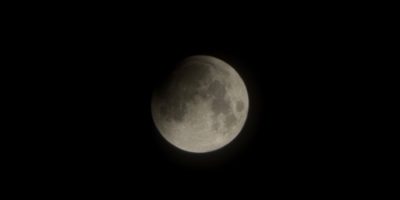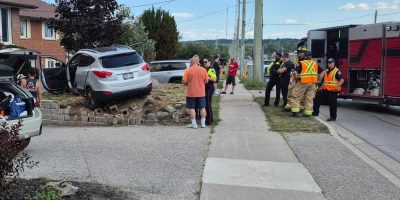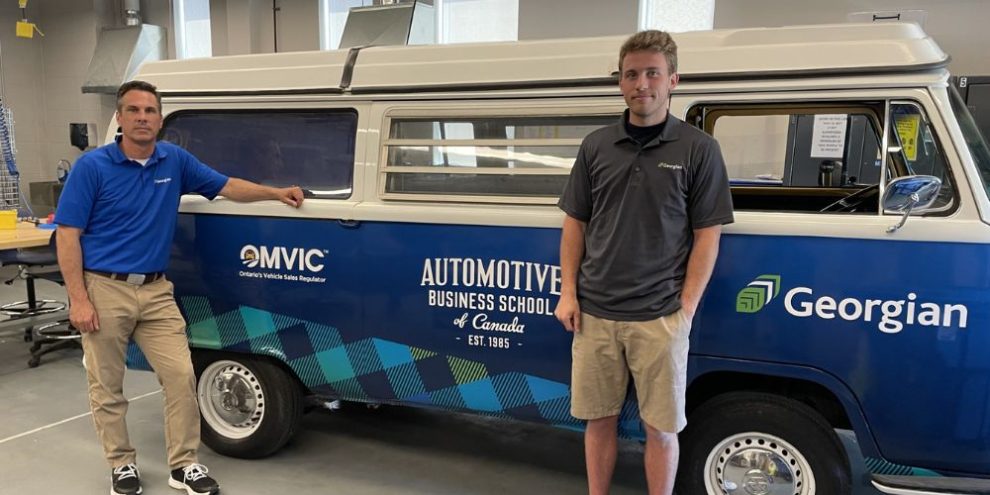
Georgian College recently unveiled a project where they retrofitted a 1972 Volkswagen Westfalia into an electric vehicle.
Professors and students from different faculties collaborated on the project, including engineering and design.
Officials with the college say the project aligns with their commitment to the United Nations’ Sustainable Development Goals.
John McCluskey, professor, Engineering and Environmental Technologies, and Hunter Moore, a Mechanical Engineering Technology student, talked with Barrie 360 about the project in an interview at Georgian College in the shop where the van now sits.
Barrie 360: So, what are we looking at right now?
Moore: You're looking at the soul of a VW that we decided to make newer and make it more versatile with the electric motor. But you're just looking at a VW bus with a different powertrain - keep it basic. We try to keep everything original except what's at the back.
Barrie 360: And what was the project? What was the main goal? You wanted to make this into an electric vehicle, talk about that.
Moore: The main goal of the project was to give students an opportunity to work with stuff that they're going to deal with in the industry. Bigger companies like Honda and Toyota are starting to do electric or somewhat electric, like hybrid. Our school hasn't really picked up on that and started teaching it. So, the teaching staff was like, 'We got to give students something to go off on and learn off of.' And this is perfect for it.
Barrie 360: And why was the VW chosen? Why was the Westfalia chosen?
McCluskey: A couple of faculty here at the college have VW products. Some have convertible bugs, another person has a VW bus and also worked on it. To be honest, they've come back into fashion, right? These used to be ten, 15 years ago, you pick them up for nothing. Now they're vintage and like anything that comes back around 50 years later, we're into some nostalgia and something that people are interested in. So, the VW 1972 camper bus with the pop-up roof was the ideal choice. It's big enough as far as standing out in a crowd, but also it is basic enough as far as the mechanics go. You're back to 50 years ago when you could actually work on your vehicle, unlike today when you open the hood and who knows what's under there.
Barrie 360: How did it come to be? Who came up with the idea to do it?
McCluskey: Some faculty, as well as the dean, were looking to, again like Hunter mentioned, integrate some of the new technologies that come with electric vehicles. This was prior to the big Honda announcement, but in the past couple of years with Tesla, with Polestar, there have been so many different manufacturers. The target is for everybody to drive one ... we know that's not realistic. I think personally, this is going to be one of many types of vehicles that are going to be on the road. We'll still have, especially with our environment, we'll still have a combustion engine, we'll have some electric vehicles, and maybe hydrogen is coming down the pipe. But with these EV chargers popping up everywhere ... we had to go down that path.
Barrie 360: It still has a transmission, maybe talk about that.
McCluskey: Retro ones where we're modifying, we still can use, and do use, the transmission just for the ratio. Motors generally have a certain torque level where they can perform best. If we hooked this up direct-drive, it would have great torque at the beginning, but then you would max out at a very low speed. So, with having the gears still in there, in this case with this bus, you'd leave it in second gear or third gear. Yeah, you're spinning your transmission faster than what it's generally manufactured for because they were around 3200 rpm, but then you're getting up to highway speeds. The motor itself is providing the power, so you're not going to stall it out like you would with a conventional 'popping the clutch' or having a combustion engine. The beauty of this, is you can mix the two, a transmission to get the ratio, as well as, in this case, a maximum torque of the 80 kilowatts motor.
Barrie's News Delivered To Your Inbox
By submitting this form, you are consenting to receive marketing emails from: Central Ontario Broadcasting, 431 Huronia Rd, Barrie, Ontario, CA, https://www.cobroadcasting.com. You can revoke your consent to receive emails at any time by using the SafeUnsubscribe® link, found at the bottom of every email. Emails are serviced by Constant Contact
Barrie 360: How many people worked on the project?
Moore: Consistently around 30. Forty people signed up originally ... but they had other things they had to do. Some of them were involved in the Honda project, like building the little units they have in here ... and then they were doing other projects that they just couldn't take everything on with school.
Barrie 360: When did the project start? And is it complete, or is there still more to be done?
Moore: Early September is when the idea came and then later September is when we started working on it. And it's not done yet. I don't think it will ever be done. There's always stuff you can do to it to improve it. Some of the students were talking about airbag suspension for the van, and lowering it, raising it. So, I feel like there's always something they can do to it to make it cooler.
Barrie 360: I think that's the neat thing about these types of projects - it's endless, right? So, what was the most difficult part of working on it for you?
Moore: Time management for me personally, because I'm in fifth semester, It's a very heavy semester, and fourth and fifth were the final heavy semesters before my co-op. Looking for co-ops on top of playing with the van and helping other students try to figure out their co-ops, too, is a lot. But once you got used to the timing, and you eventually were like, 'No, I can't do that, but I'll do this instead,' it became easier. By the end of the project, I definitely felt more comfortable with my time management, and not being behind in school, and I could also work on the van.
Barrie 360: What was it like collaborating? Because you also had design students in here, too, right?
Moore: It was awesome. Sometimes it was frustrating because it takes time to communicate with other students and to get through to other departments. We had the electrical program, we had interior design, business, and engineering. It was a lot, but it was awesome to see their ideas. Interior design put through a lot of ideas and a lot of designs. They came into the shop sometimes with us and talked to us and asked us questions like, 'What's possible within the deadline?' So, we're not pushing all this stuff through to you guys and saying, 'We've got to get a disco ball.'
Barrie 360: How much of the interior has been changed? It's been all gutted?
Moore: Yeah, we gutted the entire thing. We took everything from the front to the back out. All the seats were rewrapped in fabric because the original seats were getting older and falling apart. The flooring all got ripped out, and there were about seven layers of subflooring in there originally.
Barrie 360: What's next for this project? Because is it like a marketing opportunity? Is it going to get on the road?
McCluskey: Absolutely, it will be doing the circuit as far as any automotive events. Georgian College is involved not just directly with automotive, but tons of other skilled trades events. So, the opportunity here is to set it up - we have a little simulated campfire with Muskoka chairs - it's giving that sort of camper with relaxation, with the cool blue of Georgian. Just showcasing, it's going to be popping up everywhere.
Barrie 360: And Hunter, what's next in your journey? What are your aspirations? You want to probably work on more things like this?
Moore: Yeah, in my spare time. I like working on things like this, but I really don't like doing it for work. I'd rather just be on my own deadline. It was so nice working on this with the school because they're flexible with timing. Every week they had about three days where you could go in for five hours each day and they were really relaxed. You didn't have to go to each day. So, it was nice doing it that way, but I definitely would love to work on something similar to this ... maybe be a little sportier, a little bit more fun. And then when I graduate, just working. One thing I will say is I'd love to see other programs get involved. We didn't really have an idea for precision skills, which is the machining program, and I'd love to see some guys like that come out to build some of the new parts because, on these old vans, it's really hard to get parts. And if we get them involved for like steering or for the clutch or for the transmission, if we can get machining done for that and make new parts, that would be nice.
Barrie 360: Like you said, it's an endless adventure.
Moore: Yeah, exactly.
